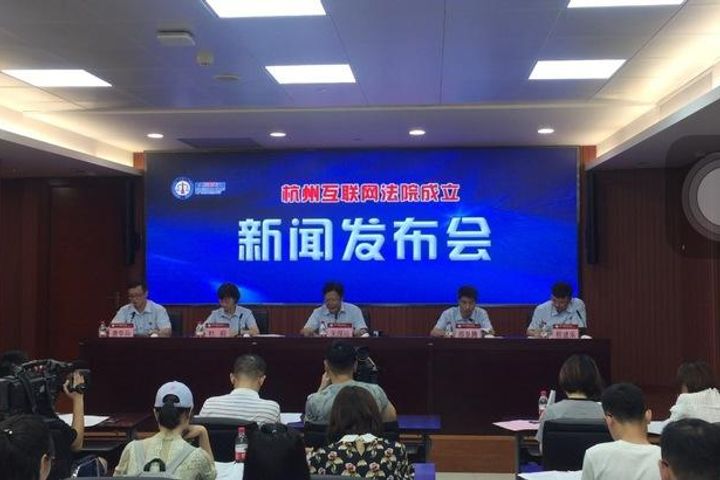 Parties File a Case in Five Minutes and Litigate It Online in 25 Minutes at Hangzhou Internet Court
Parties File a Case in Five Minutes and Litigate It Online in 25 Minutes at Hangzhou Internet Court(Yicai Global) Aug. 28 -- Litigation would be much easier if people could file cases and litigate them on the internet without ever leaving their homes.
This is already a reality in Hangzhou in China's southeastern Zhejiang province after the introduction of a dedicated internet court.
As the first virtual court in the country, The Hangzhou Court of the Internet is exploring different ways of adjudicating cases on the World Wide Web, with one of its ultimate goals to litigate cases online.
"Online shopping has made our lives much easier, so why can't we make litigation easier and more efficient by applying internet technology?" rhetorically inquired Du Qian, president of the internet court, in an interview with Yicai Global.
"The virtual quality of the internet, borderless and real-time litigation and decentralization pose serious challenges to existing legal theories and the judicial system," Zhu Shenyuan, vice president at Zhejiang province's appellate court, told Yicai Global. Offline litigation is costly and time consuming as litigants must go through the traditional legal process, so instituting an online judicial channel is justified and urgently needed.
The court has instituted the online litigation platform after rigorous checking and tests, Du noted, and members of the public can file a case in five minutes on the platform.
The court gave a demonstration of how the system works. A plaintiff registers on the platform using her cellphone number, files a complaint and submits evidence online. The system verifies litigants' identities, reviews relevant online transactions and various forms and data automatically, and simultaneously records pertinent online evidence. It also tallies the litigation fees, which parties can pay via the Alipay payment service of Alibaba Group Holding Ltd. [NYSE:BABA] or online banking services.
Where necessary, evidence can be submitted online, and cross-examination can also be conducted on the web.
With the system, trial hearing and issuance of verdicts and related legal forms all occur online, Du added. The average length of hearings is 25 minutes, and the entire litigation process lasts 32 days on average.
The Hangzhou internet court had accepted 2,605 cases and closed 1,444 as of Aug. 15, and all of them had been litigated online, per statistics the court provided.
People now can access the Hangzhou internet court litigation platform from home, and all steps throughout the litigation process from case filing, evidence submission, hearing and judgment to execution of judgment are conducted on the internet, Du noted. Each action by parties to the proceedings is continuously recorded real-time.
This means that litigants can undergo the entire process without leaving home.
"The introduction of the Hangzhou internet court represents a major institutional innovation aimed at adapting the judicial system to advances in internet technology, as the Central Leading Group for Comprehensively Deepening Reforms advised," Zhu Shenyuan noted.
President Xi Jinping heads the Central Leading Group.
The innovative internet-based litigation platform mandates that judges be familiar with law as well as the internet, and keep themselves abreast of the latest internet technologies and their applications. They also must innovate the existing system in terms of courts' jurisdictions and adjudication procedures. "The end goal is to create new channels for dispute resolution with the internet court as the final decision-making body," Zhu added.
Hangzhou's web court has devised procedures and rules centered on standard litigation procedures and live video recording of online trials. However, many issues related to litigant identification, online cross-examination and online behavior control remain to be tackled.
Online litigants are anonymous and virtual entities, making it exceedingly difficult to verify their identities.
A plaintiff must have his/her identity verified before filing a case with the court, per the Rules of Civil Procedure of the Hangzhou Court of the Internet. For identification of parties, the court now relies on real-name registration of internet users, facial recognition and offline identity verification, Du advised.
How can a judge tell if evidence submitted is authentic or not? Litigants are required to submit photos of evidence, scanned copies or electronic evidence to the platform, Du explained. Where physical evidence is involved, it is typically delivered to the judge by post before trial. Evidence is displayed online for the reference of all parties. Once judgment is rendered, enforcement can also be applied for online.
Another problem is how to ensure continuous a network connection during a trial? What if someone deliberately interrupts a live hearing?
The courts procedure rules provide that if a plaintiff drops out during a trial without proper justification, the case will be deemed to have been dismissed, while if the defendant is disconnected, the trial will proceed in his/her absence, he said.
"We record the entire trial process with intelligent voice recognition enabled, and the recordings can be used as evidence of offenses that affect court order and implicate obstruction of justice," he noted.
Hangzhou cyber-court is currently characterized as a special court, akin to admiralty, military, railroad and forestry courts, court sources told Yicai Global.